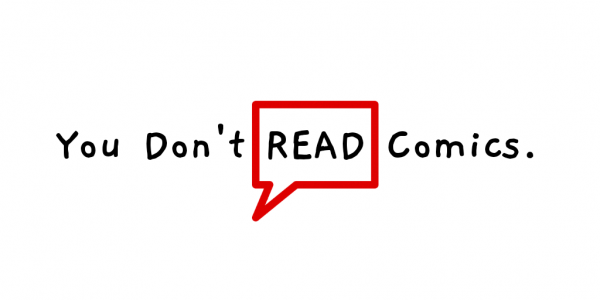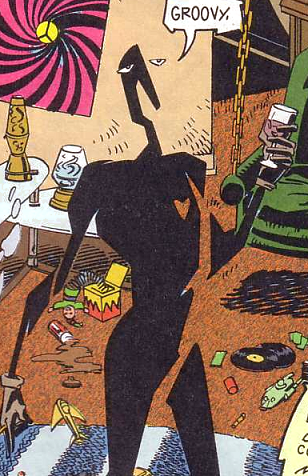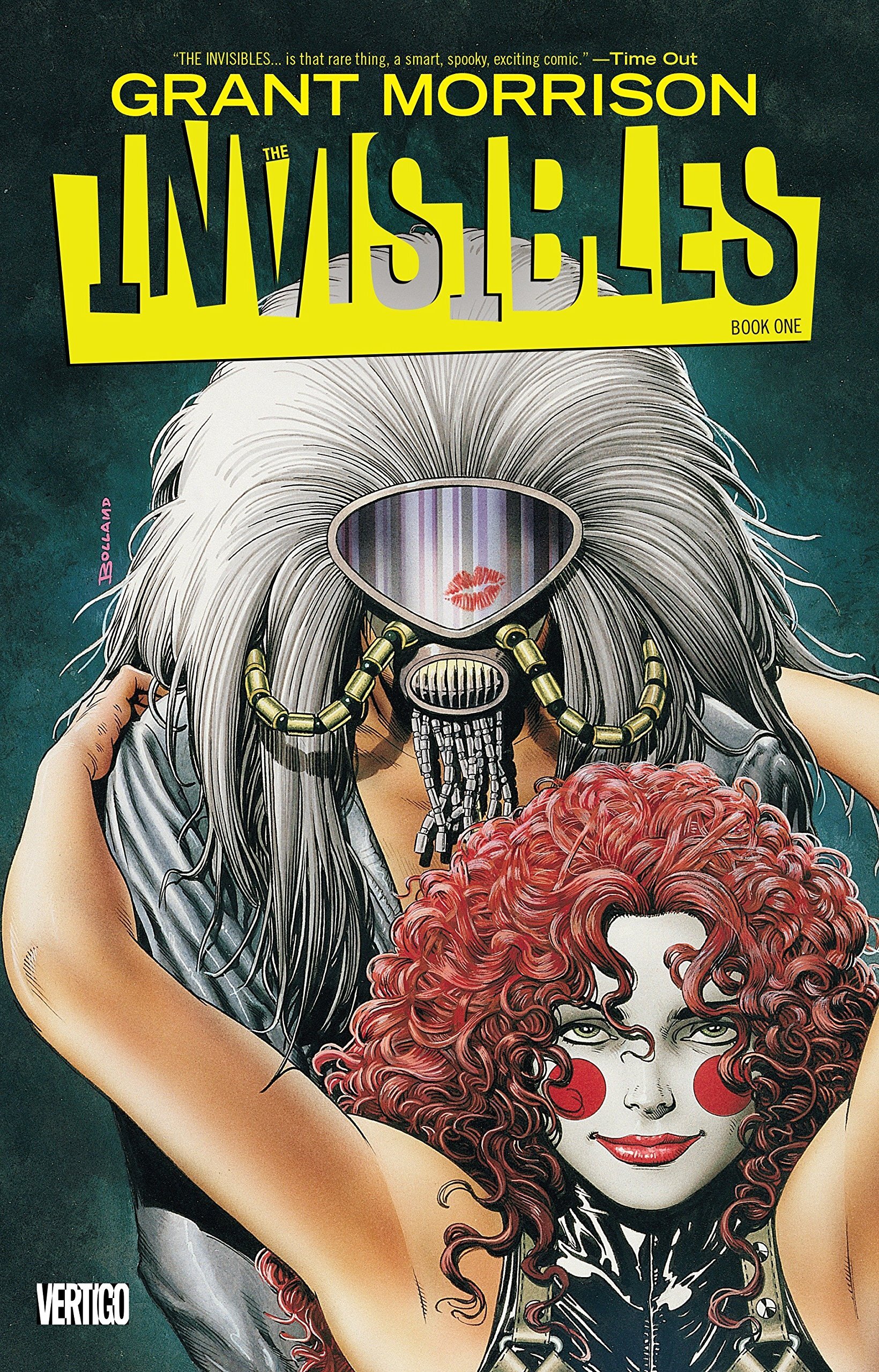Let's Talk About Grant Morrison's Doom Patrol
Hi, I’m David Harth and I’m totally going to break the rules I set out for myself. However, since I set the rules out, I don’t think it’s going to be that big of a deal if I break them. And honestly, what are you going to do about it? Sue me? I don’t have any money.
I have a lot of cool reading material, though.
Anyway, this week, we’re talking about Grant Morrison’s Doom Patrol run. The books stars Robotman (who is pretty much just called by his actual name, Cliff Steele), Rebis (an amalgamation of the original Negative Man, Larry Tainor, Eleanor Poole, a nurse who was taking care of him, and the Negative Spirit that empowered him), Crazy Jane (Kay Challis, a woman with split personalities that all have a different superpower), Dorothy Spinner (a teenage girl with the ability to bring imaginary creations to life), Joshua Clay (formerly Tempest, the team’s doctor with energy projecting abilities), and Niles Caulder (the founder of the original Doom Patrol team). They would later be joined by Danny the Street, a transgender living street that would eventually serve as their base of operations, Willoughby Kipling (a John Constantine pastiche), and Flex Mentallo, the Man of Muscle Mystery. Kipling and Flex weren’t really members of the team, but more like associates. Danny is awesome.
So, time to break the rules.
Remember when I said I wouldn’t be writing about JLA because there weren’t a lot of deep themes I could tackle? Well, Doom Patrol is sort of like that, too. There are some major themes running through the book and we’ll talk about them, but I mostly wanted to write about this one because for my money it’s the best team book ever written, full stop. So, let’s get into why I think that.
Morrison would prove himself to be an adroit team writer and this book is where all that started. One of the problems with JLA (and it’s barely a problem) is that he really only had one character in the book who he was the sole custodian of- Martian Manhunter (at least until the roster expansion he would institute in issue 16). J’Onn is a great character, but when you have the rest of the Justice League to play with, he’s going to take a bit of a backseat. Plus, JLA wasn’t a book that was about developing characters. It was about spectacle.
Doom Patrol is a different beast entirely. Morrison had complete control over all of the characters in the book. He could do whatever he wanted with them, developing them as he saw fit without having to haggle with the editorial and creative teams of other books. This free rein allowed to do a lot of amazing things with the characters in the book. The Doom Patrol were always the freaks of the DCU, and Morrison ran with that concept, while also making them feel more real (or surreal, depending on the character). The only character he didn’t develop very much was Joshua Clay, but he was a throwback to a previous run on the book when they tried to make the book more of a superhero book. He’s not a bad character, but he doesn’t get a lot of love.
Morrison really gets into the heads of the characters, especially Cliff, Crazy Jane, and Rebis. Notice how I called Robotman Cliff? That’s because you get to know him so well that he becomes something more than Robotman to you. You learn everything you need to know about Kay Challis’ painful path to becoming a superhero and you feel for her. Rebis is an unfolding enigma, but that’s not as bad as it sounds. Rebis is such an interesting character that you grow to love them even though they seem so inscrutable.
Honestly, identity is a big theme in the book. Is Cliff still a human even though he’s just a brain piloting a robot body? Is any part of Crazy Jane still Kay and if she is, can she ever have a real life? Dorothy literally lived with her imaginary friends. Is there any way she can live with reality? What is Rebis? Is it Larry? Is it Eleanor? Or is it something entirely new? Morrison does a lot of interesting psychological things in this book with each character, peeling away layers of their neuroses to get to the core of them throughout his run. It’s the freedom to do this that makes Doom Patrol, for my money, better than JLA. JLA is a lot of fun and has the biggest superheroes in the world in it, big names that everyone loves. Doom Patrol has a bunch of misfits, brought together by accidents of fate (some of which, readers will find, aren’t as accidental as they seemed). They’re a family, a messed up dysfunctional family. While the circumstances of their lives are strange and surreal, they seem more real than you can imagine until you read the book.
Morrison fits these quests for identity into amazing superhero stories. This is another place where this book really stands above the other. Morrison brings his patented brand of strangeness to the proceedings. Take for example, the Scissormen. They are the villain of the first few issues and they cut people out of reality, leaving blank spaces shaped like them in the ether. Or Red Jack, a being who is the creator of the universe, who has a room of tortured butterflies and was also Jack the Ripper at one point. Ever heard of the Bone City of Orqwith? You will here. He takes the team on the strangest interstellar adventure ever, enmeshing them in a religious civil war on a far off planet. He takes us beneath the Pentagon to reveal its dark secret. And he introduces one of the coolest “evil” superteams ever- the Brotherhood Of Dada.
Back in the old days, the arch enemies of the Doom Patrol were the Brain and his Brotherhood Of Evil. The Brotherhood Of Dada is a sort of offshoot of the group (the Brain does appear in the book, with his gorilla sidekick Monsieur Mallah, and that issue is…. oh man, it’s great). One of the members of the BoE, Eric Morden, is experimented on and given the power to drain sanity from others, matching his own insanity. His appearance is changed as well, becoming an entity of pure blackness and he becomes Mr. Nobody He’s amazing. He assembles a group of his own misfits and steals a painting that absorbs the city of Paris. The team consists of Frenzy, who can transform into a cyclone, Fog, who can absorb people into his gaseous form, the Quiz, who has every power you’ve never thought of (that is until you start thinking of them), and Sleepwalk, who has superstrength but only when she’s sleeping. They are chaos incarnate. They aren’t evil, not really, just agents of Mr. Nobody’s insane agenda.
The team appears again, but it’s an entirely different roster- Agent “!”, who has the ability to not be noticed because he comes as no surprise, Alias the Blur, a possessed broken mirror that ages people, Number None, anything or anyone who can get in your way, Love Glove, an armless man with access to the Glove Tree, full of gloves that give him powers, and the Toy. I would tell you why the team is different but I want you to read the book, so I’m being vague, They’re trying to get Mr Nobody elected president. There’s a magic bus that makes people hallucinate. It’s amazing.
Add to that characters like the Beard Hunter, the Candlemaker, the Men From N.O.W.H.E.R.E., and more and you get an idea of how strange this book is. At its core, though, it’s still a superhero book. The heroes are put into insane situations that other heroes never encounter, but they have to do what all superheroes do- resolve the insanity and save the world, be it with their fists and powers or with their reason. In fact, looking at some of the threats the team faces in this book, you can look at it as a test run for what he’d later do in JLA. JLA had the team facing a lot of big threats with a Morrison twist and this book is where he perfected that formula. It’s another reason I rate this book higher than JLA. He laid down the groundwork for it here, in this book.
Doom Patrol combines the big action feel of JLA with a character focus that is nearly unrivalled. It’s a psychological book, looking into the broken minds of its protagonists and finding their truths. The book is as much an exploration of a bunch of messed up people as it is the World’s Strangest Heroes battling the world’s strangest threats. When I finally got into the book, DC had just begun to reprint the trade paperbacks and I got the first three as they were coming out. It took my years to find the last three (I went through a rough time at the tail end of the 00s…. And the beginning of the 10s…. And like most of my adult life), but when I did, I felt like I was back with old friends again. It’s one of the few books in the medium where I really felt like the characters were real people dealing with their own neuroses and the craziness of the world around them, like everyone else. Their neuroses and the craziness of their world was different than mine, but it felt good to have them around again and learn what they were going through.
I don’t know if anyone but Morrison could pull this off. I have connected with other comic characters before, but not in the same way that I have with Morrison’s Doom Patrol. Am I a bodiless racecar driver piloting a robot body? No. I’m also not an abused person with multiple personalities or a forced hermaphrodite with superpowers or a little girl devilled by her imagination come to life. I am, though, a messed up freak who questions their place in their world. That’s the core of the Doom Patrol. A bunch of people, labelled freaks by society, questioning their place in the world. And fighting the weirdest threats you can imagine.
Before I get to my conclusion, I want to talk about Gerard Way’s Doom Patrol. People always compare it to Morrison’s and there are definitely similarities, but they feel completely different. Way’s book sometimes feels more like it’s being weird for the sake of being weird. It definitely works and is a lot of fun, but you’re not going to get the deep character analysis that you get from Morrison’s run. If you read Morrison’s stuff and like it, I definitely think you should read Way’s. Also, I never read Rachel Pollack’s follow up to Morrison’s run because it never got collected that I know of and I’m too poor to hunt down the back issues. I want to, though.
So, that’s my thoughts on Morrison’s Doom Patrol. I think that since the TV series came out, you can probably find collected editions of it if this little collection of my ramblings whets your whistle enough to want to read it. I think you should, of course. There’s a lot of special stuff in this book. I hope you check it out if you can find it.
Come back next week (or so, you never know when my life is going to fall apart and my depression is going to strike, destroying my ability to write) when I ramble, a lot, about The Invisibles. It’s going to be very long. Oh my God, we’re all going to regret this.











